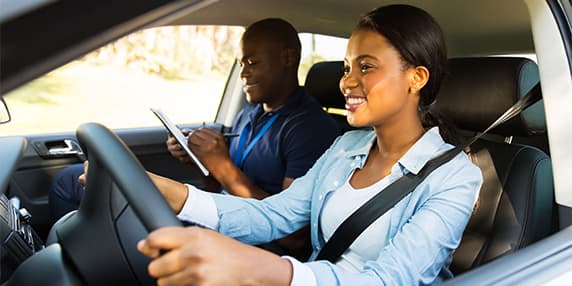Newsroom
ICBC shares top five tips for passing your road test
July 21, 2022

The summer season is here! For many that means vacations, barbeques and trips to the beach on a warm sunny day. It's also the busiest time of the year for British Columbians to take their ICBC road test.
The overall demand for road testing in B.C. is also up – last year, ICBC conducted 30% more class 5 and 7 road tests compared to 2019, and we're on pace to see a similar increase this year. Many British Columbians are also looking to get their motorcycle licences this year – with 36% more class 6 and 8 tests already conducted compared to this time last year.* Nearly half of our customers do not qualify on their first road test attempt. Not only is it inconvenient to take your road test again, with the already high demand for road tests, additional tests put pressure on the system and reduces appointment availability for those looking to get their driver's licence.“Every summer throughout the province, we see increased demand for road tests, so it's really important to take advantage of your road test opportunity," said Peter Wong, driver licensing office manager. “By being fully prepared for your test, you set yourself up for success behind the wheel and have a much greater chance of passing."
Top five tips for a successful road test:
Be ready. Driving experience and training are important. Drive as often as you can. Take some lessons with an ICBC-approved driving school if possible. Even one or two lessons can make a difference in passing your road test. Instructors can help you refine your skills, teach you safe driving practices and let you know what to expect on the test. We have many resources on icbc.com to help drivers get ready for their road test – from the Learn to Drive Smart app to the Tuning Up for Drivers guide.
Examine your vehicle. Bring a safe, reliable vehicle for your road test. Your examiner will inspect your vehicle to make sure it is safe before the road test begins. If it isn't safe (e.g. flat tire, brake or signal lights not working, seat belt not working, cracked windshield, outstanding serious vehicle safety recall) or doesn't meet legal requirements, we may have to cancel your test. See: 10 most common reasons a vehicle might not be accepted for a road test on icbc.com.
Calm yourself. Do some last minute practice on more challenging maneuvers like parallel and reverse-stall parking. Practicing at your exam location can be a big confidence booster. Get to your road test location at least 15 minutes prior to your appointment time. Leaving it too late can increase your stress and not leave you in the right frame of mind to be at your best.
Heighten awareness. Observe your surroundings and be aware of posted speed limits. A lack of awareness while on the road has led to many road test disqualifications. Speed limits can change suddenly when entering school, playground and construction zones. Also, remember to shoulder check when changing lanes, scan when making a turn and conduct a 360 degree check prior to parallel and reverse-stall parking. Driver Examiners also look for good vehicle control when making a turn on the road.
Ask questions. If you are unsure about test requirements, make sure to ask your Driver Examiner before the test begins. Come prepared with questions, and if you can, print and complete the ready for your road test card and hand it to your examiner. It helps your examiner understand your individual needs and allows you to get answers to your questions before you start. Remember, an examiner will not instruct or teach during a road test; however, you can always ask your examiner to repeat their directions or to clarify what they mean. We want you to feel as prepared, confident and comfortable as possible.
So, are you ready to take your road test? Practice, practice, practice. You got this!
Editor's note: Peter Wong is available for interviews this week.*Road test data from 2020 not included due to the temporary suspension of road testing during the pandemic. Motorcycle road tests completed from January to the end of June this year.
Regional road test statistics
We have completed nearly 103,000 road tests from January to the end of June in the Lower Mainland this year.
We have completed over 18,000 road tests from January to the end of June on Vancouver Island this year.
We have completed over 16,000 road tests from January to the end of June in the Southern Interior this year.
We have completed nearly 8,000 road tests from January to end of June in the Northern Interior this year.
